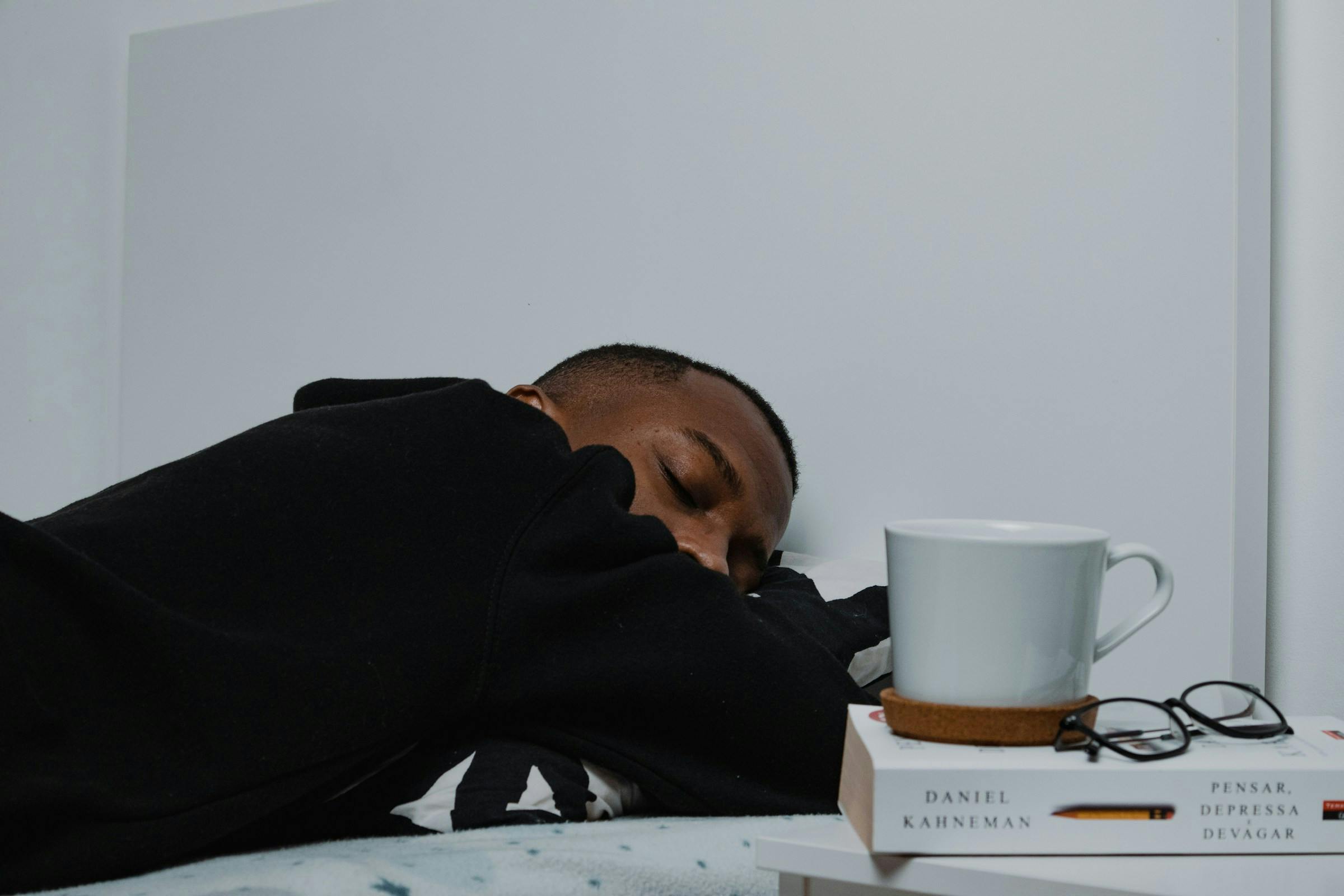The 4 Stages of Sleep Explained: What Really Happens During a Sleep Cycle
By Lilian E.
Reviewed by Dr. Jossy Onwude, MD
Published Apr 23, 2025
8 min read

Sleep. It seems so simple. You close your eyes, drift off, and wake up feeling (hopefully) refreshed. But what really goes on during those hours when you're knocked out? More than you might think.
Sleep isn't just one long, boring nap. Your body and brain actually go through a fascinating set of changes every night. These changes happen in cycles, and each cycle is made up of distinct stages. From the light dozing-off phase to deep restorative sleep and even vivid dreaming, every stage plays a unique role in helping your body recharge.
In this article, we’re breaking down what really happens when you sleep. We’ll explore the four stages of a sleep cycle, how these stages affect your health, and what happens when your sleep cycle gets thrown off. Whether you're a high school student pulling late-night study sessions, a new parent up at all hours, or just someone trying to sleep better, this guide is for you.
What Is a Sleep Cycle?
Let’s start with the basics. A sleep cycle is the process your brain and body go through as you sleep. On average, one full sleep cycle lasts about 90 to 110 minutes, and throughout the night, you’ll go through about four to six of these cycles.
Each cycle moves through four different stages, starting with lighter sleep and ending with REM sleep (more on that soon). These stages aren’t just random. Your body follows a pattern to help you repair, recharge, and get ready for a new day.
The first part of the night is usually dominated by deep sleep, while REM sleep becomes more prominent in the early morning hours. That’s why if you wake up too early, you might feel groggy or forget your dreams—you were probably in REM sleep.
Understanding sleep cycles can help you figure out why you feel refreshed some mornings and totally drained on others. It’s not just about how long you sleep—it’s about how well your body moves through these cycles.
The 4 Main Stages of Sleep (Simplified Breakdown)

Each sleep cycle has four stages: three non-REM stages and one REM stage. These stages are like steps your brain and body take to fully recharge.
Stage 1: Light Sleep (N1)
This is the gateway into sleep. Stage 1 is the lightest stage of sleep and usually lasts just a few minutes. You might drift in and out of sleep, and it’s very easy to wake up at this point. Think of it as your brain putting one foot into the sleep pool.
Your muscles start to relax, your breathing slows, and your heartbeat begins to settle down. If you've ever felt like you were falling and suddenly jerked awake, that probably happened in Stage 1.
Though this stage doesn’t last long, it’s still an important transition into deeper sleep.
Stage 2: Deeper Light Sleep (N2)
Now your body is a bit more committed to sleep. Stage 2 is where you spend most of your sleep time, and it's deeper than Stage 1 but still considered light sleep.
During this stage, your body temperature drops, your eye movements stop, and your brain waves begin to slow down. Sleep spindles and K-complexes (fancy brainwave patterns) show up on brain scans. These patterns are thought to help with memory and brain processing.
You’re harder to wake up during Stage 2, but you can still be roused by loud noises or movement. It’s a bridge to the deepest, most restorative parts of sleep.
Stage 3: Deep Sleep (N3)
Welcome to the most restful and restorative part of the night. Stage 3, also called slow-wave sleep or delta sleep, is when your body gets to work repairing and regenerating.
This stage is absolutely crucial for physical recovery. During deep sleep, your body releases growth hormone, rebuilds muscles, strengthens your immune system, and clears out toxins from your brain. It's also thought to play a role in memory formation and learning.
Waking up during deep sleep can leave you feeling groggy and disoriented. That’s why it’s best to avoid being disturbed during this stage if you want to feel truly rested.
REM Sleep: Where Dreams Happen
REM stands for Rapid Eye Movement, and this stage is where things get weird and wonderful.
Your brain becomes very active—almost as active as when you’re awake. Your eyes dart back and forth behind your eyelids (hence the name), your breathing becomes irregular, and your heart rate increases. But your muscles are temporarily paralyzed to stop you from acting out your dreams.
REM sleep is when most dreaming happens. It plays a big role in learning, creativity, emotional health, and memory consolidation. Your brain is basically sorting and storing information, and some researchers believe this is where emotional healing takes place.
Why Each Sleep Stage Matters
Every sleep stage has its own job. Think of them like a team:
- Stage 1 gently eases you into sleep.
- Stage 2 keeps you stable and lets your brain start processing the day.
- Stage 3 gives your body a tune-up and helps with immune function.
- REM sleep supports emotional and mental well-being.
Missing out on any one of these stages can lead to problems like brain fog, poor memory, low energy, irritability, and even long-term health issues. That’s why it’s not just about getting 7-9 hours of sleep—it’s about the quality of those hours too.
How Sleep Cycles Change with Age

Sleep needs and patterns change throughout life. Babies spend nearly 50% of their sleep in REM. It makes sense because their brains are developing at warp speed. Teenagers need a lot of sleep, too, but their biological clocks are set to go to bed later and wake up later (which is why 8 a.m. school start times are so tough).
As we get older, we tend to get less deep sleep and more fragmented sleep. Older adults often wake up more during the night and may have trouble getting back into those deep or REM stages.
This doesn’t mean sleep becomes less important with age—it just means we may have to work a little harder to maintain good sleep hygiene and support our natural sleep cycles.
What Happens If Your Sleep Cycle Is Disrupted?
Let’s say you stay up way too late scrolling on your phone, or you keep waking up every couple of hours. Your sleep cycle gets fragmented, and your body can’t move smoothly through the stages.
This can lead to a lot of problems:
- Less deep sleep means poor recovery and a weaker immune system.
- Missing REM sleep can mess with your memory, mood, and focus.
- Constant interruptions keep your brain from doing its nightly housekeeping.
Long-term disruption of sleep cycles has been linked to serious issues like heart disease, obesity, depression, and even Alzheimer’s disease. That’s why protecting your sleep isn’t a luxury—it’s a health necessity.
Tips to Support a Healthy Sleep Cycle
Supporting your sleep cycle doesn’t have to be complicated. Here are some simple, science-backed ways to improve your sleep:
- Stick to a consistent sleep schedule, even on weekends.
- Avoid screens for at least 30 minutes before bed.
- Keep your bedroom cool, dark, and quiet.
- Avoid caffeine in the late afternoon and evening.
- Get sunlight during the day to support your body clock.
- Use relaxation techniques like deep breathing, stretching, or meditation before bed.
These small changes can help your body flow naturally through all the sleep stages and leave you feeling more energized during the day.
RELATED READ: Best Sleeping Positions for Health, Pain Relief, and Better Sleep
FAQ: Your Sleep Questions Answered
1. How many sleep cycles should you get each night?
Most people go through 4 to 6 sleep cycles per night. That’s why getting 7 to 9 hours of sleep is recommended.
2. What’s the most important stage of sleep?
They’re all important! But deep sleep (Stage 3) and REM sleep are especially critical for body repair and brain function.
3. Can you skip REM sleep?
Not on purpose. But if your sleep is constantly interrupted or cut short, you may not get enough REM sleep.
4. Why do I wake up in the middle of a sleep cycle?
It could be due to stress, noise, caffeine, or even an inconsistent sleep schedule.
5. Is dreaming a sign of good sleep?
Dreaming itself is normal and happens during REM. But dreaming a lot doesn’t necessarily mean you had great sleep. The quality of your sleep matters more than how vivid your dreams are.
Conclusion: Respect Your Sleep Cycle
Sleep isn’t just downtime—it’s a powerful, active process that restores your body and mind. Each stage of the sleep cycle plays a unique role, and skipping any part of it can leave you feeling off.
Now that you know what really happens when you sleep, you can start making changes to protect those precious cycles. From better bedtime habits to understanding how your sleep needs shift with age, small steps can lead to big improvements in how you feel each day.
Your sleep cycle isn’t something to ignore. It’s something to respect, support, and optimize—because a good night’s sleep is one of the best gifts you can give your body and brain.
Explore more simple, science-backed health tips at meto.co.
Share this article

How Women Can Gain Muscle After 50 | Science-Backed Guide
Karyn O.
Feb 13, 20265 min read

HRT and Weight Loss: What Midlife Women Should Know
Dr. Priyali Singh, MD
Feb 13, 20265 min read

Best Women’s Probiotics for Gut, Hormones & UTIs
Lilian E.
Feb 12, 20265 min read

Best-in-class care is a click away
Find everything and everyone you need to reach your metabolic health goals, in one place. It all makes sense with Meto.
Join Meto